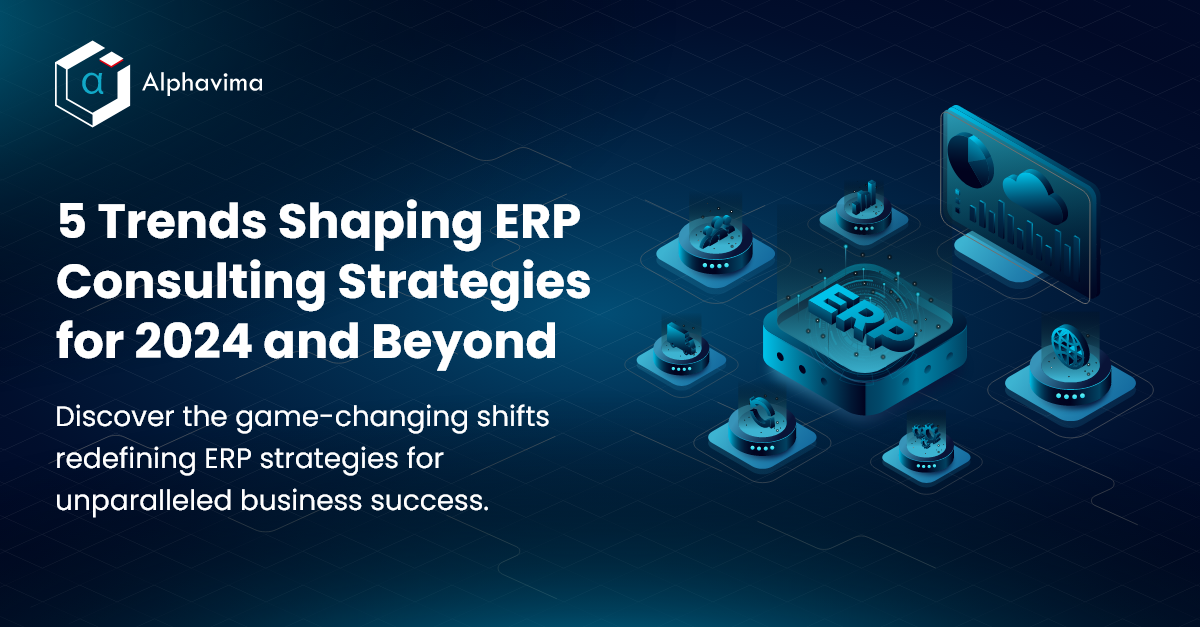Blog
5 Trends Shaping ERP Consulting Strategies for 2024 and Beyond
13 Dec 2023

Enterprise Resource Planning (ERP) systems have become the backbone of modern businesses, streamlining operations, enhancing efficiency, and providing a unified platform for managing various functions. In the realm of ERP Consulting, the landscape is constantly evolving, driven by technological advancements, and changing business needs. As we step into 2023, five transformative trends are reshaping ERP Consulting strategies, revolutionizing how businesses leverage these systems for optimal performance and growth.
Trend 1: Embracing Cloud ERP for Scalability and Agility
Shift to Cloud-Based Solutions
The migration from traditional on-premises ERP systems to cloud-based solutions continues to accelerate. According to statistics, a majority (58%) of small businesses have moved their ERP systems to the cloud, either partially or completely. (Source: International Data Corporation)
Advantages of Cloud ERP
- Scalability: Enables businesses to scale resources based on demand, ensuring optimal performance during peak times.
- Accessibility: Facilitates remote access, empowering teams to collaborate seamlessly from anywhere.
- Cost-Efficiency: It helps in reducing upfront infrastructure costs and offers an affordable model.
Implication for Consulting Strategie
ERP consultants must adapt their strategies to facilitate smooth cloud migrations, focusing on integration, security, and optimizing cloud-native features to unlock maximum value for businesses.
Trend 2: Artificial Intelligence and Automation
Integrating Artificial Intelligence and Machine Learning into ERP Systems
The incorporation of Artificial Intelligence (AI) and Machine Learning (ML) into ERP systems is revolutionizing how businesses manage data, streamline operations, and base decisions on data analysis. Study indicates that by 2025, 50% of all business software will integrate AI functionalities. (Source: Forbes)
Benefits Realized
- Predictive Analytics: Anticipating market trends, demand, and potential bottlenecks.
- Process Automation: Streamlining routine tasks, reducing manual intervention, and enhancing efficiency.
- Enhanced Insights: Extracting actionable insights from vast datasets for informed decision-making.
Consulting Strategies Adaptation
ERP consultants need to specialize in AI integration, advising on the selection of AI-powered modules, customization, and training to maximize the benefits of AI and automation within ERP systems.

Trend 3: Focus on Cybersecurity and Data Privacy
Rising Concerns Amid Data Breaches
With cyber threats on the rise, businesses are prioritizing cybersecurity and data privacy within their ERP systems. Shockingly, 60% of organizations experienced a data breach due to a vulnerability within their ERP systems. (Source: Dark Reading)
Critical Aspects
- Enhanced Security Protocols: Implementing robust encryption, access controls, and regular security audits.
- Compliance Adherence: Ensuring alignment with stringent data privacy regulations (e.g., GDPR, CCPA).
- Employee Training: Educating users on best practices to mitigate security risks.
Consulting Strategies Pivot
ERP consultants must focus on bolstering ERP security, offering comprehensive security assessments, recommending, and implementing security measures, and providing continuous monitoring and support to safeguard critical data.
Trend 4: Customization and Modular ERP Implementation
Shift towards Modular ERP Systems
Businesses are increasingly opting for modular ERP systems that allow flexibility and customization. By 2023, it's estimated that 65% of ERP implementations will involve a modular approach.
Advantages and Considerations
- Tailored Solutions: Customizing modules to specific business needs rather than adopting a one-size-fits-all approach.
- Incremental Implementation: Allowing businesses to implement ERP modules gradually, reducing disruption and cost.
- Interoperability: Ensuring seamless integration between different modules and existing systems.
Consulting Approach Adjustment
ERP consultants need to focus on understanding unique business requirements, recommending suitable modules, and devising phased implementation strategies that align with the organization's goals.
Trend 5: Enhanced User Experience (UX) and Mobility
UX-Centric ERP Designs
The user experience within ERP systems is gaining prominence. 80% of users consider ease of use a crucial factor in ERP adoption, emphasizing the importance of intuitive interfaces and seamless workflows.
A UX that is well-designed can assist in enhancing productivity, boosting user adoption, minimizing errors, and augmenting user satisfaction. (Source: First Capital)
Mobile ERP Solutions
With the workforce becoming increasingly mobile, there's a surge in demand for mobile ERP solutions, enabling access to critical information on-the-go.
Consulting Strategy Tweaks
ERP consultants should prioritize UX enhancements, offering UX audits, recommending intuitive designs, and advocating for mobile-friendly ERP solutions to enhance user adoption and productivity.
Conclusion: Navigating the Evolving ERP Consulting Landscape
As the ERP landscape undergoes seismic shifts driven by technological advancements and changing business paradigms, ERP consulting strategies must adapt and innovate. Embracing cloud technology, leveraging AI and automation, fortifying cybersecurity measures, emphasizing customization, and prioritizing user experience and mobility are pivotal in shaping successful ERP implementations in 2023 and beyond. ERP consultants equipped with these transformative strategies will undoubtedly steer businesses towards greater efficiency, agility, and sustained growth in this ever-evolving digital era.
